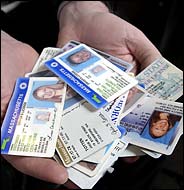Employers: Should Employers Be Suspicious of All Employees?
Thursday, July 26th, 2012 How can you tell which are the trustworthy employees in your company, and which are potential thieves? The news is filled with stories of companies who have been victimized by seemingly great workers—the ones who are always on time, helpful and friendly, who are also skimming cash out of the register or taking merchandise home every night.
How can you tell which are the trustworthy employees in your company, and which are potential thieves? The news is filled with stories of companies who have been victimized by seemingly great workers—the ones who are always on time, helpful and friendly, who are also skimming cash out of the register or taking merchandise home every night.
Most business owners don’t realize they’re vulnerable until it’s too late. In fact, the Association of Fraud Examiners released a report stating that typically, employee fraud continues for 18 months before it’s discovered.
Employee fraud affects more companies than you might expect. And since 87% of these acts are committed by first-time offenders, pre-employment screening won’t always help. That doesn’t mean it’s not necessary for helping employers determine whether a prospective employee is a good fit, based on criminal background and credit history. But it is possible for a person with a clean record to be hired, only to commit fraud on the job.
Employee fraud might entail falsifying payroll records, embezzling from company bank accounts, taking a few dollars out of the cash register on a regular basis, stealing merchandise or helping other employees cheat the company by covering up their actions.
How can business owners protect themselves from employee fraud? Should you be suspicious of all employees? No, but keep in mind the three factors that must be present for fraud to occur: motivation, opportunity and rationalization. Some employees are motivated by greed; others, by need. Know your employees. Listen to their problems. Does one have a child with a drug problem? Does another have a gambling addiction?
Then, keep your eyes and ears open at all times to make sure your employees with motivation don’t have the opportunity to steal. Implement proper controls, such as dual signatures on checks. Keep tight controls on access to cash, and never allow the same person who counts the money to also deposit it in the bank.
Finally, eliminate the possibility for rationalization. If you are skimming cash from the register yourself, what does that say to your employees? And what about the employer who brags about cheating on his or her taxes? Some employees who commit fraud think it’s okay to steal from an employer they perceive as “rich,” or whom they feel is underpaying them. This isn’t to say that you need to pay employees high wages to prevent stealing, but paying them fair wages—and never bragging about your own financial situation—can help eliminate the rationalization of thieves.
If employees like and trust you, and feel respected and trusted, they are less likely to commit fraud.





